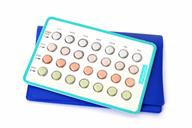Birth Control Pills (Oral Contraceptives): What to Know
Oral contraceptive pills, or birth control pills, are medicines that prevent pregnancy. They work by:
Preventing the ovaries from releasing eggs.
Thickening mucus in the lower part of the uterus called the cervix. This prevents sperm from getting in the uterus.
Thinning the lining of the uterus. This prevents a fertilized egg from attaching to the lining.
Birth control pills are highly effective at preventing pregnancy when you take them exactly as told. Birth control pills do not prevent sexually transmitted infections (STIs). Use condoms while taking birth control pills to help prevent STIs.
What happens before starting birth control pills?
Before you start taking birth control pills:
Ask your provider about the possible side effects of the birth control pills. It can take 2–3 months for your body to adjust to changes in hormone levels.
Types of birth control pills

Birth control pills have the hormones estrogen and progestin in them, or progestin only.
The combination pill
This type of pill contains estrogen and progestin hormones.
- These pills come in packs of 21 or 28 pills.
Some packs with 28-day pills contain estrogen and progestin for the first 21–24 days. Hormone-free pills, called inactive pills, are taken for the final 4–7 days. You should have menstrual bleeding during the time you take the inactive pills.
In packs with 21 pills, you take no pills for the remaining 7 days in a 28-day period of time. Menstrual bleeding happens during these days. Some people prefer taking a pill for 28 days to help create a routine.
Extended-interval contraception pills come in packs of 91 pills. The first 84 pills have both estrogen and progestin. The last 7 pills are inactive pills. Menstrual bleeding happens during the inactive pill days. With this schedule, menstrual bleeding happens once every 3 months.
Continuous contraception pills come in packs of 28 pills. All pills in the pack contain estrogen and progestin. With this schedule, regular menstrual bleeding does not happen. But there may be spotting or irregular bleeding.
Progestin-only pills
This type of pill is often called the mini-pill and contains the progestin hormone only. It comes in packs of 28 pills. In some packs, the last 4 pills are inactive pills. You need to take this pill at the same time every day to prevent pregnancy. Menstrual bleeding may not be regular or predictable.
What are the advantages?
Birth control provides reliable and continuous contraception if taken as told. It may treat or decrease symptoms of:
Menstrual period cramps, heavy menstrual flow, or bleeding from the uterus that's not normal.
Irregular menstrual cycle or bleeding.
Acne, depending on the type of pill.
Polycystic ovarian syndrome (PCOS).
Endometriosis.
Iron deficiency anemia.
Premenstrual symptoms, including very bad depression, anxiety, or getting annoyed very easily.
It may also:
Reduce the risk of endometrial and ovarian cancer.
Be used as emergency contraception.
Prevent ectopic pregnancies and infections of the fallopian tubes.
What can make birth control pills less effective?
Birth control pills may be less effective if:
You forget to take the pill every day. Birth control pills may not work as well if you miss more than one pill. You may need to use a back-up contraceptive. For progestin-only pills, it's especially important to take the pill at the same time each day. Even taking it 3 hours late can increase the risk of pregnancy.
You have a disease of the stomach or intestines that makes your body less able to absorb the pill.
You take birth control pills with other medicines that make them less effective, such as antibiotics, certain HIV medicines, and some seizure medicines.
You take expired pills.
You forget to restart the pill after 7 days of not taking it. This applies to the packs of 21 pills and extended-interval packs of 91 pills.
What are the side effects and risks?
Birth control pills can sometimes cause side effects, such as:
Headache.
Depression.
Trouble sleeping.
Nausea and vomiting, bloating, or fluid retention.
Breast tenderness.
Irregular bleeding or spotting during the first several months.
Increase in blood pressure.
Gallbladder problems.
Liver injury.
Unusual vaginal discharge, itching, or smell.
Sun sensitivity.
Birth control pills with estrogen and progestin may slightly increase the risk of:
Blood clots.
Heart attack.
Stroke.
Follow these instructions at home:
-
Follow instructions from your provider about how to start taking your first cycle of birth control pills.
-
Depending on when you start the pill, you may need to use a backup form of birth control, such as condoms, during the first week.
-
Make sure you know what steps to take if you forget to take a pill.
-
If you think you're pregnant, stop taking birth control pills right away.
Contact a health care provider if:
This information is not intended to replace advice given to you by your health care provider. Make sure you discuss any questions you have with your health care provider.
